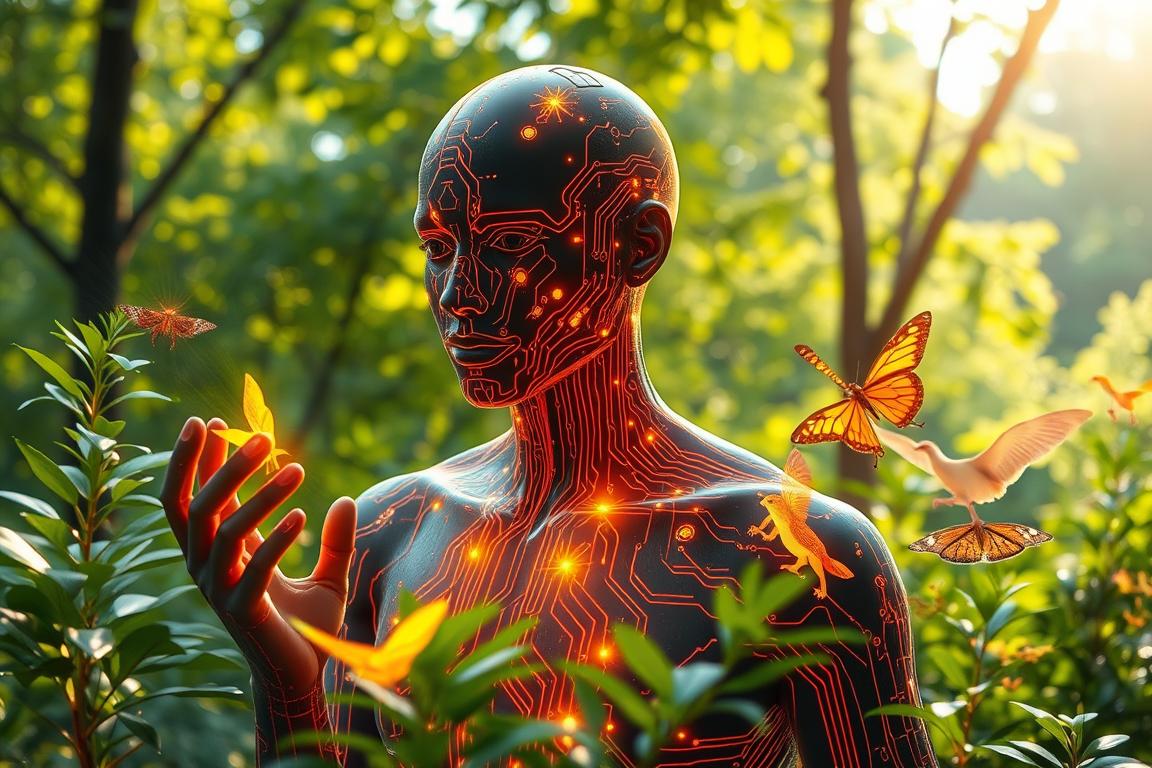In today’s world, technology and caring for the environment are coming together. Many are now embracing AI as a key partner in protecting our planet. This new approach sees AI as a virtual guide for those who love nature.
AI uses smart algorithms and follows the Gaia hypothesis. This idea views Earth as a single, connected system. It shows how technology and our planet are deeply linked.
Gaia’s idea stresses the need for sustainability. It reminds us all to take care of our environment. Now, we see AI as more than just a tool. It’s a friend that helps us connect with nature in new ways.
Let’s explore how AI can make us more eco-friendly. We’ll see how these technologies can help us appreciate nature even more.
Understanding the Concept of AI Nature Lovers
AI nature lovers blend technology with environmental care. They use AI to connect more deeply with nature and help protect it. This group is dedicated to the environment and the role of tech in conservation.
What Does it Mean to be an AI Nature Lover?
AI nature lovers see the environment through tech’s power. They use digital tools to support sustainability and protect nature. This new way of interacting with nature helps preserve biodiversity.
They use AI to track wildlife and ecosystems. This helps protect natural habitats for the long term.
The Role of Technology in Nature Conservation
Technology has changed how we protect the environment. AI and data analytics help track wildlife and habitats better. For example, AI can spot patterns in big data, guiding conservation efforts.
Smart tech improves wildlife monitoring. It helps manage natural resources effectively and sustainably. This approach encourages us to care for nature as a living being.
The Importance of Nature for Our Well-Being
Connecting with nature is key to our well-being. Research shows it boosts our mental and physical health. It’s important to understand how nature helps us.
Psychological Benefits of Nature
Nature has big psychological benefits. A study used a smartphone app to gather data from over 2000 people. It found that nature improves our mental health.
Places with lots of trees, birds, and waterways make us feel better. Being outside for 15 minutes a day can help us relax. It also makes us feel more emotionally stable.
Physical Health and Natural Environments
Nature is good for our bodies too. Even short times in nature can reduce stress. For city dwellers, nature is a break from the hustle and bustle.
Things like gardening and exercising in parks are especially helpful. Spending at least two hours a week outside boosts our health. It also makes us feel closer to the Earth.
How AI is Transforming Eco-Friendliness
Artificial Intelligence (AI) is key in making our world more eco-friendly. It helps us use resources better and tackles big environmental issues. By using smart technology, AI makes processes more efficient, cutting down on waste.
AI helps industries make choices that are better for the planet. It gives them the tools to make informed decisions about sustainability.
Smart Technology in Sustainable Practices
Smart technology is crucial for green practices in many areas. For example, AI helps farmers by predicting weather and adjusting irrigation. This saves water and boosts crop yields, helping the environment.
In cities, AI improves waste management. It predicts waste trends, reducing waste and landfill overflow. This makes cities cleaner and more sustainable.
Predictive Analytics for Wildlife Protection
AI’s predictive analytics help protect wildlife. It tracks animal movements and populations, spotting threats early. This keeps endangered species safe and guides conservation efforts.
Technologies like satellite imagery help monitor the environment. They support efforts to protect biodiversity. This is a big step forward for wildlife protection.
Examples of AI Applications in Environmental Conservation
AI has made big strides in helping protect our planet. It’s used in many ways to save ecosystems, animals, and plants. These efforts show how technology can help us care for nature.
Innovative Projects Around the World
AI is making a big difference in environmental projects all over the globe:
- Connected Conservation Initiative in Zambia uses a virtual fence with cameras to stop poachers. It helps keep animals safe in Kafue National Park.
- In Brazil, the MapBiomas water project uses AI to show how much water we’ve lost. It highlights areas that need help the most.
- The team-up between NOAA and Google AI for Social Good created a tool to understand whale songs. They used 190,000 hours of recordings to do it.
- Australia’s QUT conservation AI hub uses drones and heat cameras to count koalas. This helps protect these animals from danger.
- In Gabon, Mbaza AI was made with the University of Stirling. It can spot animals in photos with up to 96% accuracy in parks.
Success Stories from AI Nature Lovers
There are many stories of how AI is helping save animals and restore habitats:
- The Happywhale project has collected over 1 million photos. It has helped find about 30,000 whales, showing how people can help marine life.
- Wildlife Insights by Google looks at millions of photos every hour. It gives important info to those working to save animals.
- SharkEye, a project by the Benioff Ocean Initiative and Salesforce AI Research, uses AI and drones to track great white sharks. It helps keep them safe in the Pacific.
These projects show how AI is changing the game in environmental conservation. They also encourage more innovation to protect our planet.
How to Engage with AI for Eco-Friendly Living
Artificial intelligence has changed how we live, making eco-friendly choices easier. Eco apps and online learning platforms help us connect with nature. They guide us in making choices that help the planet.
Eco Apps That Connect You to Nature
Many eco apps aim to make living green easier. They raise awareness about the environment. These apps help us stay connected to nature and live sustainably:
- iNaturalist: This app lets users share their finds of plants and animals. It helps scientists understand biodiversity.
- Oceana: This app focuses on saving our oceans. It helps organize beach cleanups and teaches about marine life.
- ParkCrowd: It helps find less crowded parks. It offers virtual tours to encourage exploring nature without overloading it.
Online Platforms for Eco Education
Online learning about the environment is growing. People want to learn more about living sustainably. Many platforms offer valuable resources:
- Coursera: It offers courses on sustainability and environmental science. You can learn at your own pace.
- edX: It has programs from top universities on eco-friendly practices and green tech.
- EcoWatch: It’s a great source for news and guides on sustainable living. It encourages community action.
These tools help us learn and act on environmental issues. Eco apps and online learning empower us to live greener. They also help us appreciate nature more.
The Future of AI in Environmental Sustainability
AI technology is changing how we care for our planet. As we move forward, we’ll see big changes in this field. It’s key to understand these changes to use AI wisely and protect our environment.
Predictions and Trends in AI Technology
Computers have gotten much better over the years. In the 1940s, they used a lot of power. Now, laptops use much less. This shows AI can make things more energy-efficient.
AI is helping protect animals and their homes. For example, it helps keep sea birds safe along the East Coast. AI is making a big difference in saving endangered species.
The Role of AI in Policy Making
AI helps make better laws for the environment. It uses data to improve how we manage resources. Big tech companies are also using clean energy, which helps reduce emissions.
AI is being used in many research projects. It helps us understand and solve big environmental problems. For instance, it’s used to tell people about their local water situation. This helps us make better choices for our planet.
Building a Community of AI Nature Lovers
A community of nature lovers can make a big difference. It helps people share experiences and ideas. Together, they can tackle big challenges. This space is perfect for growing and learning together.
Connecting Like-Minded Individuals
Building connections in this community leads to important talks. People discuss how to live greener and the role of AI in saving our planet. There are many ways to connect, like:
- Virtual meetups for eco-focused talks
- Social media groups for environmental awareness
- Projects that help make the world more sustainable
Online Forums and Resources
Online forums are key for those who love nature and tech. They offer a place to share knowledge and learn from experts. You can:
- Discover new AI ideas and projects
- Join in on discussions about AI’s role in saving the planet
- Support local green projects and share your own stories
Using these online spaces helps build a strong community. It empowers people to work together for a greener future. These efforts show how much we all care about using tech to protect our planet.
Myths and Misconceptions about AI and Nature
The field of artificial intelligence is often debated, leading to many myths and misconceptions. These myths make it hard to understand how AI helps in nature conservation. By clearing up these myths, we can see how AI supports human efforts to protect our environment.
Debunking Common Myths
One common myth is that AI can fully replace human insight in ecological matters. AI uses inductive reasoning to analyze big data and predict outcomes. But it can’t match the unique, non-measurable aspects of human life.
Many think AI works just like human brains. But this is a big mistake. Creating AI as smart as humans is still a goal far from reach.
- Many assume AI has reached superintelligence, but this remains a distant goal.
- People often confuse progress in narrow AI with human-like thinking machines.
- The hype around AI often hides the real science behind it, slowing down important research.
- Today’s machine learning can’t create autonomous machines that threaten humanity.
Understanding AI’s Ethical Implications
It’s important to talk about AI’s ethics to clear up misconceptions. People often ignore issues like bias and accountability in AI’s use for the environment. Misunderstandings about intelligence and inference hold back AI research in ecology.
The hype around AI has turned to disappointment as we see its true capabilities. Machine learning lets machines find patterns, but it’s different from traditional programming. Traditional methods give machines clear instructions, unlike AI’s learning approach.
Tips for Becoming an AI Nature Lover
Starting your journey as an AI nature lover requires a proactive mindset. It’s about blending artificial intelligence with a love for nature. Simple steps can lead to big changes in your eco-friendly lifestyle.
Easy Steps to Get Started
- Download apps that focus on sustainability and conservation. These tools help you stay updated on local wildlife and environmental issues.
- Attend workshops on AI in conservation. Learning from experts can deepen your understanding of how tech helps protect our planet.
- Join projects focused on nature conservation. Working together allows for shared learning and grows your network.
Tools and Resources for Learning
Using various learning resources can boost your knowledge and skills. Many platforms share insights on AI and environmental practices.
- Books on AI and environmental science dive deep into these topics.
- Podcasts with industry leaders offer new views on eco-friendly tech innovation.
- Online courses on AI in sustainability let you learn at your own pace.
Collaborating with AI for Environmental Projects
Working on environmental projects can get better with the help of AI. People and AI systems can team up to make eco-initiatives more effective. This partnership brings technology into conservation efforts, making them more successful.
Groups and individuals can use AI tools to make a bigger difference. This is especially true for protecting wildlife and managing resources.
How to Partner with AI Systems
Partnering with AI systems means knowing the tools available for environmental projects. AI has improved in predicting deforestation, analyzing wildlife data, and using resources better. Here are ways to partner:
- Use tools like the Nature Risk Tool to check land for biodiversity and ecological risks.
- Work with groups like WWF, which uses AI in its conservation work, for their knowledge.
- Use AI apps to make data analysis easier and improve project planning.
Crowdsourcing Ideas for Eco Initiatives
Crowdsourcing eco ideas gets people involved in environmental projects. This way, many ideas come together to solve big ecological problems. Communities can use online platforms with AI to sort and choose the best ideas. For example:
- Host hackathons to create AI apps for sustainability.
- Have brainstorming sessions where AI helps sort and improve ideas.
- Get local businesses and people involved to grow support.
Conclusion: Embracing AI for a Sustainable Future
Looking at our role in nature, we see how important tech and caring for the environment are. By loving AI and nature, we can help make the world better. Using new tech helps us connect deeper with nature and protect it for the future.
Reflecting on Our Role as Nature Lovers
AI can really help us fight climate change. At recent meetings, experts talked about how AI can solve big problems. Learning about AI and its ethics is key to a greener future. It helps us grow and join forces for the planet.
The Power of AI in Climate Action
The AI market is set to hit $190 billion by 2025, showing its big role in saving the planet. AI can lead to new ways to fight environmental issues and create jobs. Let’s use AI to make big changes in how we live and work, for a better tomorrow.







